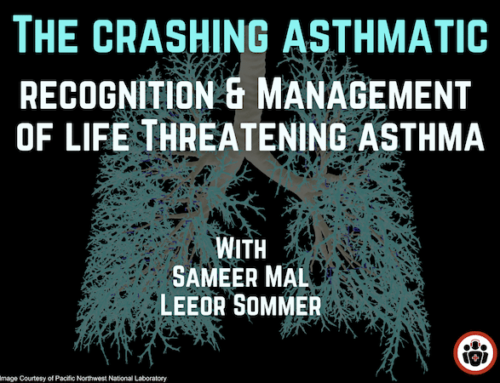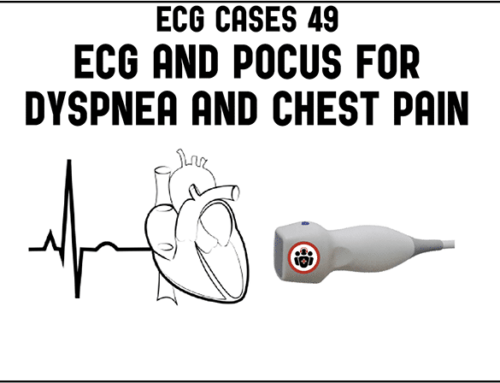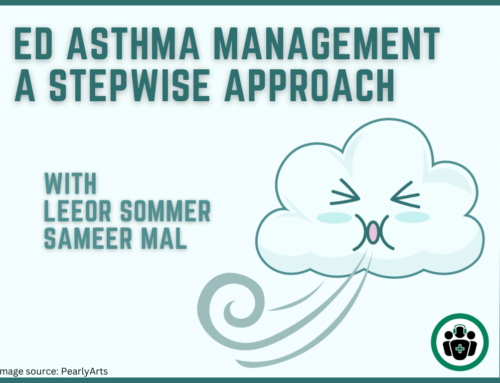Written by Joel Lexchin and Howard Ovens, February 2017
Introducing the EM Cases Official Conflict of Interest Policy
EM Cases has enjoyed phenomenal growth since its inception in 2010. As of February 2017 the EM Cases podcasts have been downloaded almost 4 million globally and the website visited more than 1.5 million times. EM Cases is widely consulted within the emergency medicine community. When he first created the podcast, Anton relied on the participation of invited experts, mostly leveraging his own academic relationships. He did not set out expecting interest from advertisers since, as with any new site, its sphere of influence was initially small. Conflict of interest (COI) was then only a theoretical concern. Then in May 2015 EM Cases joined the Schwartz/Reisman Emergency Medicine Institute and became a Free Open Access Meducation site (see WTBS blog Funding FOAM) . At that time the issue of industry advertising was settled; we would refuse any advertising that would compromise or appear to compromise our objectivity.
With success some things have become easier for Anton and our team. Experts are more willing to accept invitations to participate due to the greater impact they can expect and the ability to include the work on their academic CVs. People now come to us to suggest topics, and recently a new phenomenon has emerged: Some people have requested a particular subject be covered and wished to be involved as one of the panel experts.
In some cases consideration of the topic and potential links to commercial products raised a concern to us about potential COI. This created a dilemma; we did not want to insult sincere colleagues who are passionate about a condition or disease in their scope of practice, but we also want to be scrupulous in providing material to you that is objective and evidence-based. Would a declaration of potential conflicts meet our needs? Would our panel format allow a transparent debate on the issues?
It was clear we needed a policy we could post, one that would inform objective decisions that our audience and potential speakers could understand. In developing a policy the first thought we had was that requesting and posting declarations might be sufficient, but one concern I had was that industry funding these days can be cleverly indirect; declarations may not reveal the full story. So I did what I often do: I asked a trusted colleague for advice.
I’ve known Dr. Joel Lexchin, an emergency physician and health policy expert, since medical school in Toronto, Ontario, Canada, in the 1970s. Joel was aware of the influence of the pharmaceutical industry when most of us still thought a free pen or some pizza for lunch were big perks of little moral consequence. Joel spoke and wrote courageously on the issue before most of us had clued in, and today he is a recognized and highly sought expert on the subject.
Joel pointed me to, among other things, the progressive policy of the BMJ on this issue, as explained in the editorial “Medical journals and industry ties”. The relevance to our site was obvious; EM Cases is all about education, and so as of February 1, 2017, we also have a zero-tolerance policy on participation in our program by anyone with any potential or perceived COI on the topic to be discussed. We will post the declarations of our contributors. In case of dispute the decision of our advisory board will be final. Our full policy is posted here.
We debated whether we should obtain declarations retroactively for experts who participated in past episodes. Our intention has always been to present objective, evidence-based information, but our approach on how best to do that is evolving and could change in the future. Other institutions, including BMJ and the New England Journal of Medicine, have introduced new policies on conflicts without addressing previous work. Therefore we have also decided that this is a policy for now and for the future.
Why are we doing this? Is it really necessary? I thought it best to answer that question by having Joel express his thoughts on this subject for us in this month’s guest post to Waiting to be Seen.
—Dr. Howard Ovens
The Golden Rule: Those Who Have the Gold Make the Rules

One of the prevalent myths about COI is that when someone is accused of being conflicted there is the assumption that she or he has been bribed. In nearly all cases that is not what is happening at a conscious level. Most doctors who give talks on behalf of drug or device companies have sincerely held beliefs. Instead, what is happening is that doctors are being affected at a subconscious level through the gift relationship.
Dr. Robert Cialdini, a professor of psychology at Arizona State University, describes one example of how the gift relationship was successfully exploited by the Hare Krishna movement, an Eastern religious sect. “A robed Krishna would walk up to a person in an airport and give them a gift, such as a flower. … Often, people attempted to return the gift, but the Krishnas declined to take them back, requesting a donation instead. People who didn’t want the flowers often gave money anyway.” [2]
Another way to think about the gift relationship is with Christmas or other seasonal greeting cards. If you receive a card from someone to whom you didn’t bother to send one this year, chances are that next year that person will be on your list. Relationships with drug companies work in a similar fashion. Gifts may be meals, free samples of medications to give to patients, educational items, or just the break from the office routine that doctors get when they talk to sales representatives. But each of these gifts instills the feeling in doctors that they need to reciprocate.
For the most part, we assume we will not be affected by our relationships with drug companies, although many of us also probably thought that Canadian Prime Minister Justin Trudeau was being disingenuous when he recently said he and his cabinet ministers could not be bought for the $1,500 individuals paid to attend party fundraisers. In one American study, 61% of first- and second-year internal medicine residents surveyed stated they were not influenced by industry promotions and contacts, but only 16% believed other physicians were similarly unaffected.[3] In a Canadian example, the more medical students and housestaff doing psychiatry rotations in Toronto were exposed to drug companies—i.e., the more money and promotional items they received—the more likely they were to believe that talking to company reps did not affect how they prescribed medications.[4]
When it comes to how to deal with COI, nearly everyone is in favour of disclosure. People should openly reveal their conflicts, and once that’s happened we should judge what they have to say or what they write based on the merits of their talks or articles. However, there are a few flaws in this line of reasoning.
First, there is no evidence that disclosure is sufficient to resolve problems. In an article in the Journal of the American Medical Association that outlined how to reduce COI in academic medical centres, the authors discussed why disclosure is not enough. “First, physicians differ in what they consider to be a conflict, which makes the disclosure of conflicts incomplete. Because declarations of conflict are usually unverified, their accuracy is uncertain. Second, recipients of information who are not experts in a particular field often find it impossible to identify a biased opinion that they read or hear about that subject. Third, disclosure may be used to ‘sanitize’ a problematic situation, suggesting that no ill effects will follow from the disclosed relationship.”[5]
A controlled trial has shown that people generally do not discount advice from biased advisers as much as they should, even when COIs are disclosed. Furthermore, once people have disclosed their conflicts and their audiences have been warned, they then feel morally licensed and strategically encouraged to exaggerate their advice.[6]
So, back to whether Emergency Medicine Cases should accept input from doctors who have relationships with drug or device companies. I applaud the stance that Anton and the EM Cases Advisory Board have taken in declining to take material from these people. When faced with what to do about COI, the most principled stance is not to manage it but to avoid it.
—Dr. Joel Lexchin, Professor Emeritus, School of Health Policy and Management, York University, and Staff Emergency Physician, University Health Network
References
- Kassirer JP. Medicine’s obsession with disclosure of financial conflicts: fixing the wrong problem. In: Snyder PJ, Mayes LC, Spencer DD, editors. Science and the Media: Delgado’s brave bulls and the ethics of scientific disclosure. Amsterdam, Boston, London: Academic Press; 2008. p. 79-89.
- Cialdini R. The power of persuasion. Stanford Social Innovation Review. 2003;1(2):18-27.
- Steinman M, Shlipak M, McPhee S. Of principles and pens: attitudes and practices of medicine housestaff toward pharmaceutical industry promotions. American Journal of Medicine. 2001;110:551-7.
- Hodges B. Interactions with the pharmaceutical industry: experiences and attitudes of psychiatry residents, interns and clerks. CMAJ. 1995;153:553-9.
- Brennan T, Rothman D, Blank L, Blumenthal D, Chimonas S, Cohen J, et al. Health industry practices that create conflicts of interest: A policy proposal for academic medical centers. JAMA. 2006;295:429-33.
- Cain D, Loewenstein G, Moore D. The dirt on coming clean: perverse effects of disclosing conflicts of interest. Journal of Legal Studies. 2005;34:1-25.
Disclosures
In 2015 and 2016 Dr. Joel Lexchin was a paid consultant on two projects: one looking at indication-based prescribing (United States Agency for Healthcare Research and Quality) and a second deciding what drugs should be provided free of charge by general practitioners (Government of Canada, Ontario Supporting Patient Oriented Research Support Unit and the St Michael’s Hospital Foundation). He also received payment for being on a panel that discussed a pharmacare plan for Canada (Canadian Institute, a for-profit organization). He is member of the Foundation Board of Health Action International.
Dr. Howard Ovens receives a stipend for his work advising the regional health authority and provincial government in Ontario on emergency health services.





Leave A Comment